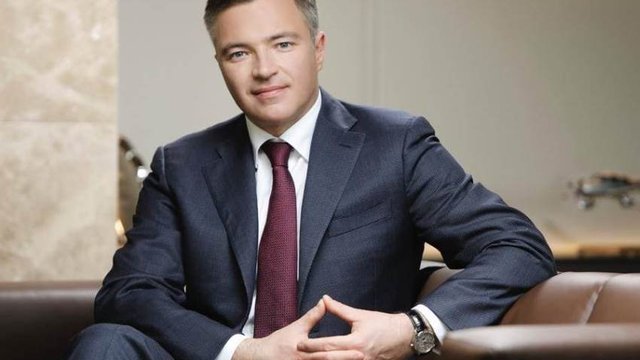Purchase of Russian slabs means support for aggressor, Russia's defense industry, their supplies to EU must be banned in 2024 – Metinvest CEO

The Metinvest mining and metallurgical group considers the purchase by European consumers of Russian-produced slabs as support for the aggressor regime and the Russian defense industry, calling for a ban on supplies to the EU of these products in 2024.
"The ban on Russian rolled steel in the EU should extend to slabs in 2024. However, some steel producers argue the impossibility of replacing slabs from the Russian Federation. After the occupation of assets in Mariupol, we completely changed the supply chain and know how to do it in the EU," Metinvest CEO Yuriy Ryzhenkov said in his column for NV Business.
At the same time, he noted after losing Mariupol plants – Azovstal and Illich Iron and Steel Works – the company restructured all procurement and logistics and all the group's rolling assets in Europe now operate on slabs from other suppliers.
"Do we use Russian slabs? No, of course not. Can Europeans replace Russian slabs at their enterprises? Yes, of course. We need to make a little effort, remembering that economic issues are also connected with moral ones. Because buying Russian slabs means supporting the aggressor regime and the Russian defense industry," the top manager said.
According to him, in general, the annual volume of the global slab market is about 30 million tonnes, of which, before the full-scale invasion, more than 10% was produced by Metinvest's Mariupol plants. Also, more than 30% of the market was occupied by Russian suppliers, 25% by Brazilian ones, and the rest was shared by manufacturers from around the world.
Metinvest has three rolling mills in Western Europe – Ferriera Valsider and Metinvest Trametal in Italy and Spartan in the UK, which until 2022 annually consumed more than 1.2 million tonnes of slabs produced by Mariupol plants.
With the loss of the Mariupol plants, Metinvest faced a new unprecedented challenge. The company had to not only supply its European facilities with semi-finished products, which were historically vertically integrated into the overall group structure and used 99% of Azovstal and Illich Iron and Steel Works slabs, but also to ensure their profitability.
"And we successfully coped with this challenge. Not only did we not stop production, but we even maintained the workload of plants at almost pre-war levels," the CEO said.
He explained that the speed of decision-making helped overcome this issue within tight deadlines. The management structure was reorganized and autonomy was granted to the procurement unit, providing flexibility and efficiency in addressing supply issues. It is critical in a volatile market.
Additionally, supplier diversification took place. The company now has more than 15 suppliers from Europe and Asia. Some of them were practically absent from the slab sales market until 2022 and produced them for their own needs.
There was also a reorientation of production in line with market trends.
In addition, there is the exploration of new sales markets. Until 2022, the company's European plant products were practically not sold in Central and Eastern European countries because the group focused on selling products from the Mariupol plants. Also, Russian manufacturers historically had a significant presence in these regions. Today, this territory has become, to some extent, a "blue ocean" with huge unmet demand and, as a result, favorable prices.
Metinvest placed emphasis on the search for internal unconventional solutions. Previously, slabs were always produced only at its Mariupol plants. The production of semi-finished products at Zaporizhstal for third parties was not considered due to technical and technological limitations. When this issue arose, the plant's specialists managed to organize the production of slabs suitable for rolling the basic assortment of European plants. These slabs are already being used in some volume by the group's Italian plants. There are plans to start producing sheets from them at the British Spartan in the near future.
"What should Europeans do in this situation? Should they support the steel industry of the aggressor country for their own comfort? Or should they make efforts, refuse Russian products and stop sponsoring the killing of peaceful Ukrainians? The question is not rhetorical at all. But it can be asserted that ensuring uninterrupted and, most importantly, profitable production of sheet metal without using Russian semi-finished products is not only a feasible but also a critically important task for European manufacturers," the CEO believes.
With steel consumption in the EU declining by 7% and 5% respectively over the last two years, European manufacturers should consider using idle capacity to produce and supply semi-finished products to the internal EU market. Today, not only European regulatory authorities but also consumers themselves demand documentation from manufacturers proving the absence of Russian-origin steel in the composition of final products. Most consumers choose not to sponsor the war and refuse to buy sheet metal made from Russian slabs.
"And in this context, the decision of the European regulator to ban the import of finished products made from Russian-origin steel while leaving a loophole in the form of temporary permits for semi-finished products seems illogical. The European steel association Eurofer takes a corresponding position, and has issued a statement on the need to reject additional requests for exemptions from the ban on the import of Russian steel from several member countries protecting the profitable business models of individual rolling mills. I hope that the planned ban on the export of Russian slabs on September 1, 2024, as well as the planned ban on the export of Russian steel slabs to the EU on April 1, will come into effect, thus closing another channel of the European Union's dependence on the aggressor country," Ryzhenkov concluded





